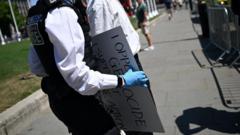Why Were 13 People Arrested at the Palestine Action Protest in Norwich?

Understanding the Controversy Surrounding Palestine Action and Recent Arrests in Norwich
The recent events in Norwich have sparked widespread debate and concern regarding freedom of expression, the right to protest, and the implications of governmental actions against organizations deemed to be terrorist entities. The arrest of over a dozen individuals in support of Palestine Action has raised questions about the balance between law enforcement and civil liberties, particularly in the context of a proscribed group. This article delves into the circumstances surrounding these arrests, the broader implications of the proscription, and the ongoing discussions regarding protest rights in the UK.
The Arrests: What Happened in Norwich?
On a seemingly typical day in Norwich, a protest took place outside City Hall, drawing attention to the ongoing support for Palestine Action. This demonstration, which began around 12:30 BST, quickly escalated into a confrontation with law enforcement. Thirteen individuals were arrested for allegedly displaying support for Palestine Action, a group that was recently declared a terrorist organization by the government. The arrests were made under Section 13 of the Terrorism Act 2000, which prohibits support for proscribed organizations.
Of those apprehended, five individuals were taken to Wymondham police station for further questioning. The remaining eight were subsequently de-arrested after providing their details to the police. Additionally, a 14th individual had their sign confiscated. Superintendent Wes Hornigold emphasized that while the police aim to facilitate peaceful protests, they also have a duty to maintain order and prevent potential disruptions in the community.
The Context of the Proscription of Palestine Action
Palestine Action was officially banned by the Home Secretary, Yvette Cooper, following several incidents of criminal damage, including notable attacks on planes at RAF Brize Norton. The government's rationale for this ban was rooted in the assertion that the group posed a significant security threat, with Cooper citing strong security advice and evidence of planned further attacks. This designation as a terrorist organization carries severe legal consequences; membership or support for Palestine Action is now criminalized, with penalties reaching up to 14 years in prison.
The decision to proscribe Palestine Action has been met with a mix of approval and condemnation. Proponents argue that the ban is necessary for national security, while critics contend that it infringes on fundamental rights, including the right to free speech and the right to protest. This division has prompted ongoing discussions about the implications of such a ban on civil liberties in the UK.
The Response from Law Enforcement
The response from law enforcement has been assertive, with the Metropolitan Police announcing plans to prosecute additional individuals for supporting Palestine Action. In the wake of the ban, more than 700 arrests have been made, including over 500 in central London alone. This proactive approach by the police underscores a commitment to enforce the law strictly, even as it raises concerns about the potential overreach of their authority.
Superintendent Hornigold's statements highlight the delicate balance between facilitating peaceful assembly and preventing disorder. He reiterated the police's commitment to protecting the local community while also enforcing the law against those who may seek to disrupt it. This stance has led to widespread speculation about the future of protests related to Palestine Action and similar causes.
The Legal and Ethical Implications
The legal framework surrounding the proscription of Palestine Action raises significant ethical questions. Critics, including Amnesty International, have expressed concern over the mass arrests that have occurred since the group's ban. The organization's chief executive, Sacha Deshmukh, termed the situation "deeply concerning," drawing attention to the potential erosion of civil rights in the face of national security measures.
Furthermore, the High Court's ruling allowing Palestine Action to challenge its proscription indicates that legal battles will likely continue. The group's co-founder, Huda Ammori, and her legal team argue that the ban infringes upon the right to free speech and acts as a gag on legitimate protest. This legal challenge could set a significant precedent regarding the limits of government power in regulating speech and assembly.
Public Sentiment and the Role of Media
The events in Norwich and the broader crackdown on Palestine Action have ignited a firestorm of public sentiment. Supporters of the group view the arrests as unjust and a violation of democratic principles, while opponents argue for the necessity of such actions in the interest of public safety. The role of media in shaping this narrative is crucial, as reporting can influence public opinion and inform individuals about the complexities of the situation.
Social media platforms have also become battlegrounds for discourse on this issue. Hashtags related to Palestine Action have gained traction, enabling supporters to voice their opinions and mobilize against what they perceive as governmental overreach. This digital activism highlights the evolving nature of protest in the 21st century, where online platforms can amplify calls for change.
The Future of Protests in the UK
As the situation surrounding Palestine Action continues to evolve, the future of protests in the UK hangs in the balance. The government's stringent measures against the group could deter some individuals from participating in demonstrations, fearing legal repercussions. However, history has shown that attempts to suppress dissent can often lead to increased activism and solidarity among supporters.
Moreover, the ongoing legal challenges against the proscription of Palestine Action may pave the way for broader discussions about the rights of individuals to express their beliefs peacefully. The outcome of these legal battles could redefine the landscape of protest rights in the UK, potentially influencing future legislation and policies regarding free speech and assembly.
Conclusion: The Need for Balance in Rights and Security
The events unfolding in Norwich and the broader implications of the proscription of Palestine Action underscore the critical need for a balance between national security and the rights of individuals to protest peacefully. As discussions continue regarding the legitimacy of the ban and the government's response, it is vital to reflect on the principles of democracy and civil liberties that underpin society.
In navigating these complex issues, it is essential for all parties involved to engage in constructive dialogue that respects both security concerns and the right to free expression. As the legal battles progress and public sentiment shifts, the future of protests in the UK remains uncertain yet crucially significant.
Frequently Asked Questions
What is Palestine Action, and why was it proscribed?
Palestine Action is a group that has been involved in direct action campaigns in support of Palestinian rights. It was proscribed by the UK government due to its involvement in criminal activities, including damage to military aircraft. The government cited security concerns as a primary reason for the ban.
What are the legal consequences of supporting a proscribed organization in the UK?
Supporting a proscribed organization in the UK can lead to serious legal repercussions, including arrest and prosecution. Penalties can reach up to 14 years in prison for engaging in activities that support such organizations.
How can individuals legally protest in the UK?
Individuals can legally protest in the UK by ensuring their demonstration is peaceful and does not disrupt public order. It is advisable to inform local authorities of planned protests and to adhere to any legal requirements to avoid potential arrests.
As the debate surrounding Palestine Action and the right to protest continues, how do you see the balance between security and civil liberties evolving in the future? #PalestineAction #FreedomOfSpeech #ProtestRights
Published: 2025-08-16 20:42:23 | Category: technology



